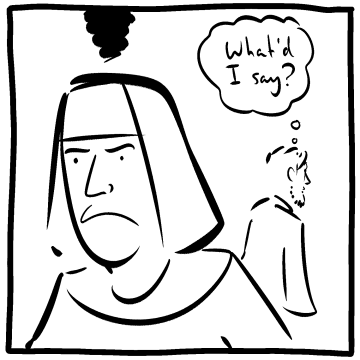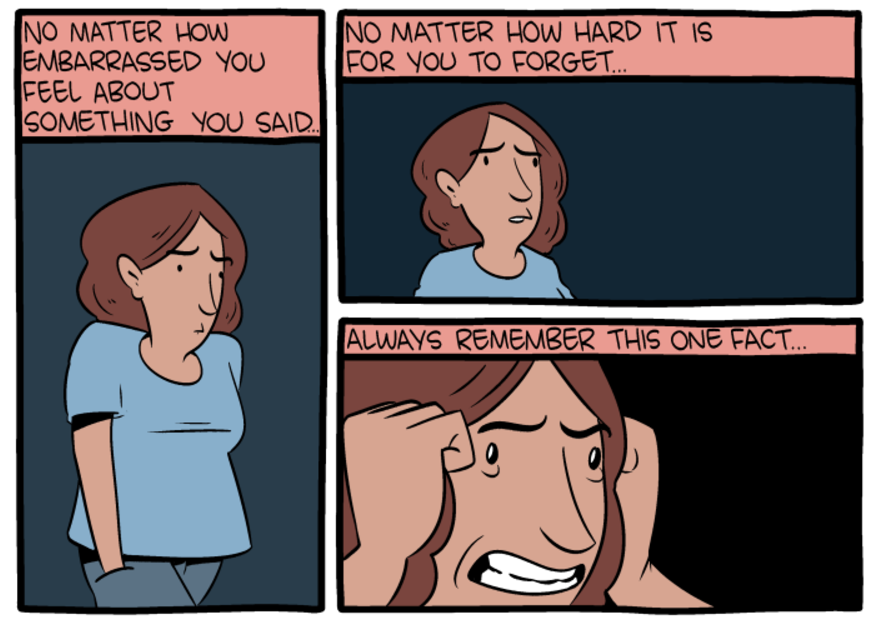The comforts of literature
« previous post | next post »
Today's SMBC:
The mouseover title: "Or maybe that was just his cover story…"
For the full story, see:
"Twat v. Browning", 1/19/2005
"More on Browning, Pippa and all", 1/19/2005
The aftercomic:



Rube said,
September 7, 2017 @ 7:29 am
Printer: "You sure about this, Mr Browning?"
"Yes, yes. Look, I'm grateful about you catching the 'Pippa pisses' thing, but everything else is fine."
Nicholas Berry said,
September 7, 2017 @ 8:00 am
Browning was famous for not checking what words meant.
He nearly drove James Murray (editor of the OED) mad, as Murray had to write to Browning again and again, asking hem what he meant by this or that word.
Rube said,
September 7, 2017 @ 8:08 am
@Nicholas Berry: Browning's education, which largely consisted of him reading whatever he felt like,gave him some pretty eccentric ideas as to what words meant and what was common knowledge, leading to his notoriety for obscurity even in his own lifetime.
Rose Eneri said,
September 7, 2017 @ 8:32 am
I've always been curious about the difference between British and American pronunciation of the letter a in various environments. It seems to me that in many words Americans are more likely to use the "father" vowel and the British, the "bat" vowel. To my American ear, Browning's lines do not rhyme. That is, bat and twat have 2 different vowels. I wish I could think of more examples.
When did the pronunciations diverge? Which pronunciation was the original and which one diverged?
Jonathan Lundell said,
September 7, 2017 @ 9:16 am
I've wondered whether the influence of "toit" might not have contributed to Browning's misapprehension. (OED, but not SOED, is oddly prudish here, but does mention Browning's mistake.)
Robert Coren said,
September 7, 2017 @ 9:59 am
@Rose Eneri: I don't think Browning's rhymes are necessarily intended to be exact. Cf. woods/moods, and I doubt that he normally stressed gallantry on the second syllable.
Andrew M said,
September 7, 2017 @ 10:33 am
Nevertheless, it is true that in the UK 'twat' typically does rhyme with 'bat'. (In any case, Browning's error derives from his reading of a poem in which 'twat' is rhymed with 'hat'. I suspect he had never heard the word spoken.)
Rube said,
September 7, 2017 @ 10:48 am
@Andrew M: If Browning had ever encountered the word outside of an old book, I doubt if he would have made the mistake he did.
Daniel Barkalow said,
September 7, 2017 @ 11:35 am
I first encountered this story before I otherwise encountered the word in question, leading to the odd situation that I didn't know what "twat" meant, aside from that it was not too bad to print but not appropriate to explain, and definitely wasn't something nuns wear.
mollymooly said,
September 7, 2017 @ 11:44 am
My theory is that the TRAP pronunciation originates in Northern England, home of flat-vowels, flat caps, and plain-spoken folk who use sexual terms as insults and insults as endearments; and that it was adopted by southerners who didn't realise it was the same word as the obscenity they pronounce with the LOT vowel. Google "David Cameron" + "too many tweets".
RP said,
September 7, 2017 @ 1:08 pm
@Rose Eneri,
It's interesting that you say "It seems to me that in many words Americans are more likely to use the 'father' vowel and the British, the 'bat' vowel."
I'd have thought that it was more the other way round (with "twat" an exception, of course): there are numerous words have the "father" vowel in Received Pronunciation but not in General American. "Bath", "fast", "pass", etc. Of course, it is an oversimplification to consider this a BrE/AmE difference: I'm a BrE speaker and use the "bat" vowel in all such words, and so do many others. However, I use the "father" vowel in "can't", "shan't", and usually in "rather" too. I'm not sure that many Americans would.
I suppose on the written page, if we had never heard the word spoken, none of us would know whether "twat" should rhyme with "bat" or with "swat"/"what". "Twat" with an "o" is the older spelling ("twot" being a later variant), but this doesn't settle matters as to the original sound (if there ever was a universally agreed sound): someone who pronounced it "twot" could use either spelling.
M-W gives the "father" vowel as the sole option, and it's the only pronunciation I've heard from Americans – whereas "twat" with the "bat" vowel is the only pronunciation I've ever heard in Britain.
However, it's interesting to note that the 2nd edition of the OED gave only "twot" as the pronunciation. (The 3rd edition line gives both pronunciations for BrE, and wrongly gives the "bat"-vowel version as the sole AmE pronunciation!). The OED cites a 1958 novel by Henry Williamson which spelt the word "twott" – and Williamson was an English writer. So there is some circumstantial evidence that the "twot" pronunciation (which for BrE speakers is different, of course, from the "father" vowel, whereas most AmE speakers merge the two) is old and may originally have been widespread in Britain as well.
Of course, not just the pronunciations but also the meaning differs between varieties. In BrE, a "twat" (when used figuratively) is an individual of either sex, if anything usually male, whereas AmE seems to use it almost exclusively for women. Another difference is that, although the primary "literal" meaning is "vulva" in both countries, AmE has an alternative (dialectal) meaning of "buttocks" (recorded as an AmE alternative meaning by both the OED and the M-W unabridged). This seems to be a common BrE/AmE difference (see also "fanny").
RP said,
September 7, 2017 @ 1:09 pm
I meant that the "a" spelling is older.
BZ said,
September 7, 2017 @ 2:03 pm
Didn't George Carlin say that he liked "twat" because it has no other meaning than the literal one? In any case, to me (AmE) figurative "twat" does not pre-suppose gender.
RP said,
September 7, 2017 @ 2:22 pm
"OED, but not SOED, is oddly prudish here"
True, the OED doesn't bother providing a definition, simply referring the reader to the definition given in Bailey's Universal Dictionary of 1727, which is one of the citations, and which defines the word using Latin!
However, it's not all that "odd", is it? After all, the entry was published in 1916 and hasn't been properly updated since then, and the words "cunt" and "fuck" didn't make it into the OED at all until the Supplement of 1972.
Jonathan Lundell said,
September 7, 2017 @ 2:29 pm
ML anticipated my comment in an earlier post, I see: "oddly circumspect", pointing out that the same OED has a straightforward definition of "cunt". (I'm not convinced that the 1964 citation necessarily supports the sense "buttocks".
RP said,
September 7, 2017 @ 2:41 pm
I noticed that too (that "cunt" receives a straightforward definition), but that definition was, after all, written more than half a century later. However, apart from that, the OED is inconsistent at times.
The 1964 citation may not definitively support the sense "buttocks", but there is no doubt that the 1950 citation does so – though that's simply a quotation from the American Dialect Society rather than actual usage.
Webster's Third has these three definitions:
1. vulva – usu. considered vulgar.
2. slang: buttocks.
3. slang: woman.
While this supports my claim that in AmE it's used to refer mainly to women (when used as an insult), my info could be out-of-date. As for George Carlin's statement that the word has no figurative use, M-W online doesn't include any ( https://www.merriam-webster.com/dictionary/twat ).
Finally, it's interesting that Webster's Third considered only the "vulva" sense to be vulgar, and only the other two senses to be slang.
Lazar said,
September 7, 2017 @ 2:47 pm
But there are some words (chiefly borrowings) that go the other way – e.g. "pasta", "mafia", "macho", "latte", "Uganda".
On the other hand, I wouldn't include "twat" in this class – not just because it's an "indigenous" word, but also because, strictly speaking, it's the "bother" vowel that's being used here, not the "father" one. I speak one of the AmEng dialects that distinguish the two, and say "twat" as [ˈtʰwɒːt] – rhyming with "cot", not with, um… Gujarat. (Hard to think of any words that end in [ɑːt] for me.)
Andrew (not the same one) said,
September 7, 2017 @ 2:56 pm
My sense is that the root meaning is largely unknown in the UK (or was until recently: more interaction with US speakers may have changed this, especially given the potential for causing offence if it is used unknowingly). I always knew it simply as an all-purpose insult with overtones of 'fool'. (And a relatively mild one, unlike the other word of similar origin, which is an extreme insult – though it also is applied mostly to men – and whose root meaning is certainly known.)
And yes, the only pronunciation I'm familiar with is the one that rhymes with 'bat'.
Lazar said,
September 7, 2017 @ 3:13 pm
I'd also add that "twat"-like-"cot" is the more regular pronunciation: "ancient short a", as you could call it, became /ɒ/ after /w, ʍ/ (watch, wasp, swat, want, wand, wander, wallop, what*, was*), except before velars (wag, whack, swagger).
*These have mostly shifted to /ʌ/ in AmEng (as has "want" for some speakers).
KeithB said,
September 7, 2017 @ 3:47 pm
But what about Twerp coming from TW Earp?
In one of Tolkien's letters he mentions "TW Earp, the original twerp"
David L said,
September 7, 2017 @ 4:38 pm
I was innocent of the true meaning of twat until one day when I was in college and a friend told this terrible joke:
A man is flying from London to New York and the stewardess asks him, "would like you like some of our TWA coffee?" "No," he says, "but I'd like a taste of your TWA tea."
My friend told this joke to a group of half a dozen people, all of whom were totally bemused. So he had to explain.
Geoff said,
September 7, 2017 @ 4:43 pm
On pronunciation uncertainty: in Australia there are many Aboriginal place names spelt (for example) Wagga and pronounced Wogga (like a BrE short 'o' – there is no cot-caught merger).
Given that the settlers would have had no reason not to spell the new names rationally, I've always assumed that the pronunciation must have first been something like Wahga, but has shifted in the 150 years since then. I'd welcome any comment from anyone who knows more about this.
J.W. Brewer said,
September 7, 2017 @ 7:33 pm
A "buttocks" sense of "twat" is a new one on me, in my four-to-five decades of practical exposure to vulgar and slang registers of AmEng. I wonder whether it was strongly regional, or became archaic before my generation was around (although I know certain obsolete vulgar slang expressions on account of having seen them in old novels and the like, and I can't say I've encountered that sense there either). Or maybe some dialectologist got confused and/or had his leg pulled by an informant once upon a time, and the error propagated into some reference sources before dying out? But for the sources cited upthread, I would have said "buttocks" was just as much a misunderstanding as "nun's hat."
And yeah definitely the LOT vowel (not merged with CLOTH for me).
Separately, there were recently a bunch of news stories with clickbaitish headlines like X% of men/Y% of women don't know where the vagina is, but they all seemed to boil down to a survey that didn't prove much beyond the not-to-surprising fact of a lot of ordinary speakers not making a contrastive distinction for lexical purposes between vagina and vulva, and thus being less precise in their usage than an anatomy textbook would be. I'm wondering if giving the "core" non-slang meaning of "twat" as "vulva" is misleading by giving a narrower scope of reference than actual (vulgar but non-metaphorical) use, at least in AmEng, involves. Something of broader scope like sense 3 here would probably be more accurate. https://en.wiktionary.org/wiki/pussy#Noun
Jason M said,
September 7, 2017 @ 10:40 pm
Agree with @J. W. Brewer. I am an American, lived in Northeast, mid-Atlantic, Old South, roots in Midwest, lived in California, now in St. Louis. Heard all sorts of British usage of twat and, much less frequent, AmEng usage. Never understood it to mean buttocks anywhere. "Fanny" pretty much means only buttocks to me in US and never…um (or for the BrEngers 'erm').."twat", whereas twat never means fanny but only twat, and twat's pretty strong as oaths go. Would be very insulting for nuns to even hear he word twat, let alone to bring theirs into the woods to share with monks!
Adam Roberts said,
September 8, 2017 @ 3:53 am
Browning wasn't alone. Holidaying in the Highlands in 1848, Arthur Hugh Clough wrote a long poem centred on a Scottish rural retreat, or Bothie. He asked locals what might be a good fictional Gaelic name for his location and they told him: the Bothie of Toper-na-Fuosich. After the poem had been published he discovered, to his horror, that his means 'The Bothie of the Twat' (my understanding is that it literally means '… the hairy well-mouth'). In later editions Clough changed the named to the cod-Gaelic The Bothie of Tober-Na-Vuolich.
dainichi said,
September 8, 2017 @ 5:18 am
@Rose Eneri,
Are you thinking about words like borrowed words like 'pasta' and 'taco'? I've noticed that for at least some words like these, BrE tends to have /æ/, whereas AmE tends to have /ɑ/, presumably because these are the closest vowels the dialects have to the [ä]ish sound they're trying to imitate.
Lazar said,
September 8, 2017 @ 5:38 am
@dainichi: Yeah, I mentioned that above. This usage can even extend into simple hyperforeignism: for one example, Rihanna says her name with /æ/, but Americans almost uniformly say it with /ɑː/.
Canadians, on the other hand, go in totally the opposite direction, using /æ/ in these cases even more than RP does. (I think it may have to do with their /æ/ often being centralized, and their /ɑː/ often being rounded.)
ajay said,
September 8, 2017 @ 6:02 am
"Bothie" is more commonly spelt "bothy" nowadays, and not capitalised… see https://www.mountainbothies.org.uk/
ajay said,
September 8, 2017 @ 6:08 am
A less embarrassing but equally prominent mistake: Browning again, coming across "slughorn", pronounced roughly "slew-orn", a variant spelling of "slogan" meaning a war-cry (from the Gaelic sluagh ghairm; the "gh" has turned to a hard "g" as in "yoghurt", "Baghdad"), and thinking that it should be written and pronounced "slug-horn", meaning a sort of musical instrument:
A slug-horn would clearly be a sort of small trumpet used for encouraging hunting slugs to close with their quarry. (Hunting slugs? Yes indeed. My American friends assure me that in the US it is common practice to hunt deer with slugs.)
Robert Coren said,
September 8, 2017 @ 10:25 am
Re the spelling of twat/twot: There's an e. e. cummings poem that, in mu recollection, uses the o spelling:
…
some like it shot
some like it hung
some like it in the twot
nine months young
Re its use in the UK for a generic insult, irrespective of the sex of the target: Likewise for cunt, which is pretty much never used of a male in the US (now-mostly-obsolete gay male slang usage excepted, and in that case there's gender-switching involved anyway).
Re its relative permissibility vis-a-vis cunt: The American TV cable channel FX had a show a few years back called Rescue Me, which centered on a New York City firehouse. In one of its early seasons, the firehouse acquired a female firefighter, and the men harassed her in various ways; one such had Denis Leary's character ask her "Which is more offensive, 'twat' or the c-word?" — a joke that was completely spoiled by the network's unwillingness to have him say cunt.
Lazar said,
September 8, 2017 @ 11:06 am
@Robert Coren: I gotta say, as a youngish American I've hardly ever really heard "cunt" used in the wild, and have mostly just heard or seen it in discussions of the word – or when used by Brits or Aussies. The comedian Bill Burr (who has a working-class Boston persona) uses "cunt" of men, in the British way; there's also an episode of Curb Your Enthusiasm where Larry gets in trouble for calling a guy a cunt.
J.W. Brewer said,
September 8, 2017 @ 12:30 pm
It is a bit tricky to check the relevant prevalence of cummings' alternative spelling via the google books corpus because of interference from the many works of Biblical scholarship that cite the Theological Workbook of the Old Testament, but while a decidedly minority variant, it is not totally unattested in cummings' sense, being used by such literary worthies as Noel Coward (being catty about Tallulah Bankhead), the translator Ralph Manheim (Englishing some French word employed by L.-F. Celine), and a not-very-well-known one-time bohemian novelist who was 20-odd years ago a pro bono client of mine after he'd been sued for defamation for some of his non-fiction writing.
J.W. Brewer said,
September 8, 2017 @ 12:33 pm
Sorry, typo or damn-you-autocorrect problem. The oft-cited TWOT is a worDbook, not worKbook, apparently some sort of annotated concordance of significant Hebrew lexemes.
Adrian said,
September 8, 2017 @ 5:53 pm
Swat (a fly) and SWAT (team) are clearly (?) pronounced to rhyme with hot, but Swat (in Pakistan) is not, which can catch out the unwary https://www.youtube.com/watch?v=rhVAEBk5K_Y
mollymooly said,
September 8, 2017 @ 5:54 pm
"a joke that was completely spoiled" — I'd say a joke that was replaced by a funnier one.